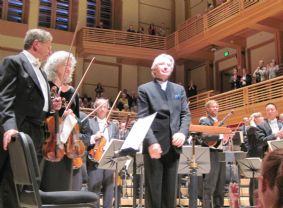|
Symphony
FROM THE NEW WORLD TO THE OLD WORLD
by Peter Lert
Saturday, June 14, 2025
Chamber
MC2 DUO RECITAL CLOSES 222'S SEASON
by Terry McNeill
Saturday, June 14, 2025
Choral and Vocal
CANTIAMO SONOMA'S LUSCIOUS A CAPELLA SINGING IN SEASON ENDING CONCERT
by Pamela Hicks Gailey
Sunday, June 8, 2025
Symphony
SRS SEASON ENDS WITH RESOUNDING TA-TA-TA-BANG
by Terry McNeill
Sunday, June 1, 2025
Symphony
YOUTHFUL VIRTUOSITY ON DISPLAY AT USO'S MAY CONCERTS
by Peter Lert
Saturday, May 17, 2025
Symphony
MYSTICAL PLANETS AND LIVELY GERSHWIN ORTIZ AT FINAL SRS CONCERT
by Peter Lert
Sunday, May 4, 2025
Symphony
VSO'S CONCERT MUSIC OF TIME, MUSIC OF PLACE
by Peter Lert
Sunday, April 27, 2025
VOCAL ELEGANCE AND FIRE AT THE 222'S RECITAL APRIL 26
by Pamela Hicks Gailey
Saturday, April 26, 2025
CANTIAMO SONOMA SINGS AN INSPIRED GOOD FRIDAY MOZART REQUIEM CONCERT
by Pamela Hicks Gailey
Friday, April 18, 2025
DRAMATIC SHOSTAKOVICH SYMPHONY CLOSES PHILHARMONIC'S 25TH SEASON
by Terry McNeill
Sunday, April 13, 2025
|
 |
 Michael Tilson Thomas' Curtain Call in Weill Sept. 12 |
CHALLENGING WORKS FROM A POWERHOUSE ORCHESTRA
by Terry McNeill
Thursday, September 12, 2013
Launching the first fall season concert in Weill Hall, the San Francisco Symphony played a peculiarly challenging program Sept. 12 to an audience that was happy to encounter more than just the popular Tchaikovsky B Flat Piano Concerto.
"Challenging" was the operative word for the Third Prokofiev Symphony, a work from 1928 that has few current podium champions. One conductor who loves the work is Michael Tilson Thomas, and he drew an inspired and brilliant performance from his orchestra. This is a corrosive piece, not as easily assimilated as the composer’s First and Fifth Symphonies, and the audience of 1,100 seemed dazed at the initial clangor and dissonance of the opening Moderato. Mr. Thomas adopted a quick march-like tempo, and balances were critical, as the piece needs sonic space and careful baton control to convey the prevailing mood of unrest. Brass and tympani playing were terrific, and a lonely note from bassoonist Stephen Paulson ended the movement.
A bucolic Andante led into the third movement’s intricate string passages, the long first section sans winds or brass. The scintillating playing brought the music to a caricature of a high-level film score. There were virtuoso brass, flute and piccolo solos throughout.
Mr. Thomas drove the finale like a determined massive machine, plodding at first and really pretty grim until ending with heavy percussion blows and blaring but crystal-clear brass. The applause was strong but not overwhelming, perhaps more in admiration for the orchestra’s sonic achievement than appreciation of the complicated and demanding music.
Tchaikovsky’s Op. 23 Concerto, with Israeli-American pianist Yefim Bronfman, concluded the first half. As in Mr. Bronfman’s Beethoven concerto performance last season with the same orchestra, the playing was replete hallmarks of his artistry--secure scales, a strong left hand and octaves that never failed him in a concerto crammed with fast two-hand octave passages. But as in his first Weill Hall performance, Mr. Bronfman brought little that was individual in his interpretation, and his habit of half-pedaling descending runs hampered clarity. Solos from clarinetist Carey Bell and flutist Tim Say were splendid, as was beautiful oboe playing from acting Principal Jonathan Fischer
Though Mr. Bronfman had the requisite power for the Concerto, the acoustics in the wonderful Weill Hall favor a big orchestra, and one wonders if even the most orchestral of pianists--powerhouses like Horowitz, Hofmann and even Anton Rubinstein--could be clearly heard in fortissimo passages over Mr. Thomas’ resounding orchestra.
The concert opened with Canadian composer Zosha Di Castri's 12-minute exploration of eerie sound, Lineage (2013). Written for Miami’s New World Symphony and the San Francisco Symphony, the piece is a mournful and haunting set of recurring small themes, flitting about with sharp contrasting passages. Ms. Di Castri, in the audience and greeted by the conductor at the work’s conclusion, asks for a large orchestra to produce a ghostly tapestry of sound, and I counted five percussionists (with loud bells, chimes, and marimba), piano and celesta. It was daring music in its whirling and spooky way, a highlight of the evening, and received a glorious performance and a happily intrigued audience reaction. Lineage is a colorful candidate for entering the San Francisco Symphony’s repertoire.
Though the hall’s galleries were full, many orchestra-level seats were conspicuously empty at this concert, perhaps reflecting the husky ticket prices for prime seats.
|

